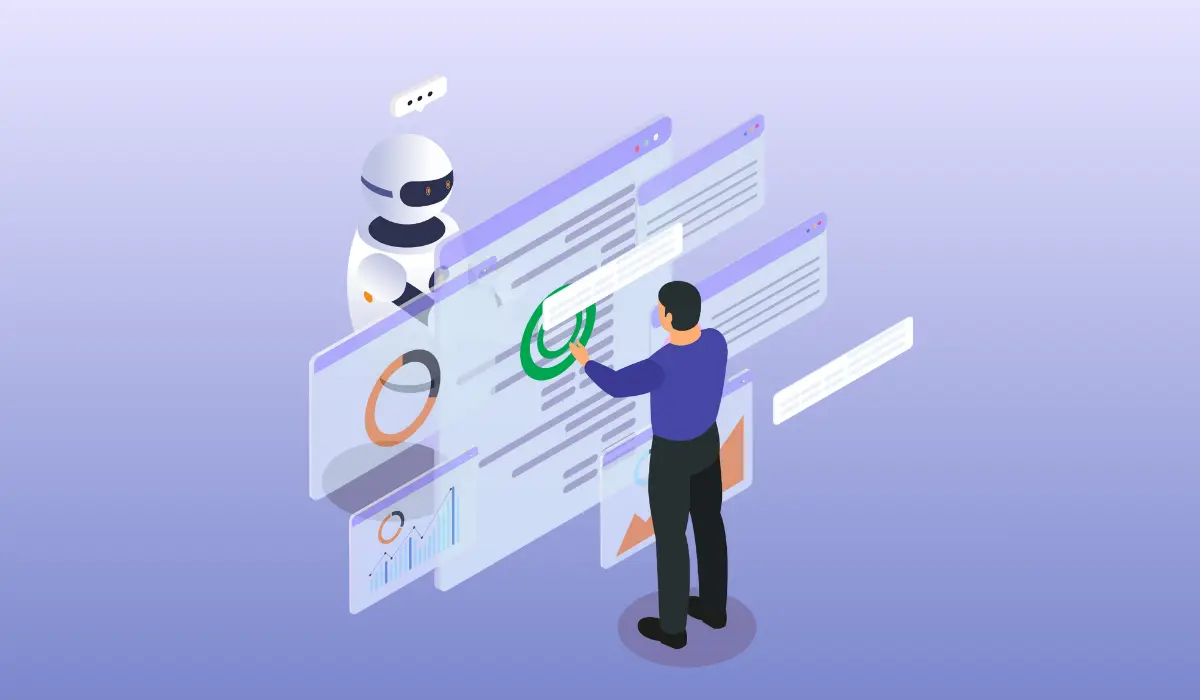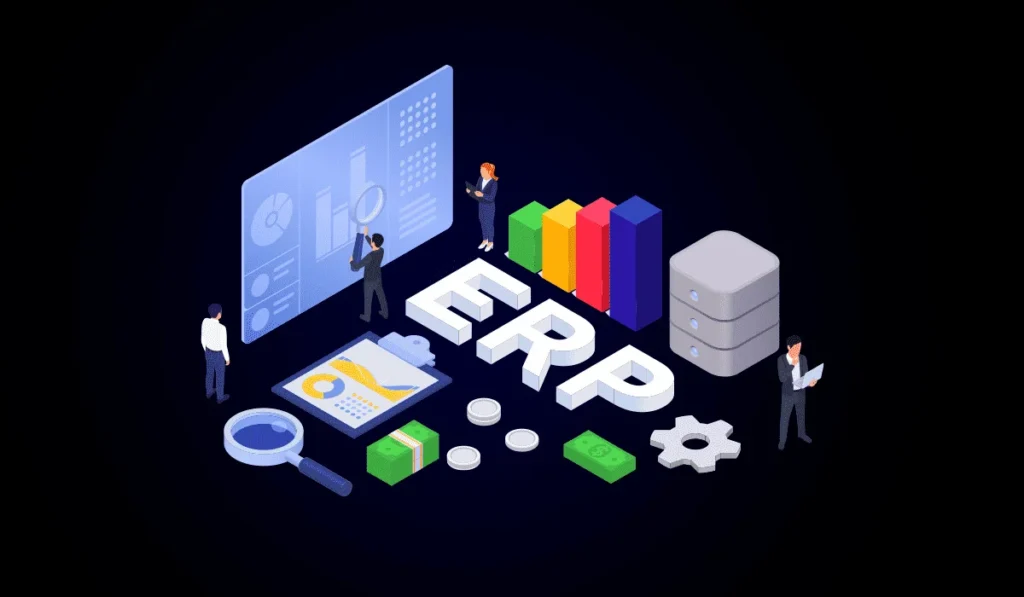Entrepreneurs of all sizes should always be on the lookout for ways to optimize their operations and stay ahead in their fields.

Risks and Impact of AI in Human Resources

Entrepreneurs of all sizes should always be on the lookout for ways to optimize their operations and stay ahead in their fields.
For small businesses, leveraging technological solutions is not just an option; it’s a necessity for survival and success in today’s competitive market.
One such vital tool that has revolutionized the way small businesses operate is Enterprise Resource Planning (ERP) systems.
Content index
In this blog, we’ll explore Enterprise Resource Planning (ERP) systems in small businesses. Through this, you’ll get an idea of ERP benefits for small businesses.
But before that! A simple question!

Enterprise Resource Planning (ERP) is a comprehensive software solution designed to integrate and manage core business processes, such as finance, human resources, and more, into a single unified system.
The traditional perception may be that ERP is reserved for large corporations with substantial budgets.
However, modern ERP systems have evolved to cater to the unique needs and constraints of SMEs.
ERP in small businesses plays a crucial role in driving operational excellence and fostering business growth.
Implementing ERP in small businesses can lead to cost savings, better resource utilization, and increased competitiveness in the market.
It also allows for scalability, enabling businesses to easily adapt and grow as their needs change.
ERP in small businesses streamlines processes, reduces manual tasks, and provides real-time data and insights, leading to improved efficiency and decision-making.
With ERP, small businesses can automate routine tasks, track inventory levels accurately, manage finances more effectively, and enhance customer service.
Enterprise Resource Planning (ERP) systems consist of various modules designed to streamline and integrate essential business processes.
Let’s explore the key components of ERP and understand how each contributes to the overall efficiency of an organization:
Project management within an ERP system helps businesses plan, organize, and track tasks and resources involved in various projects.
This includes setting project timelines, assigning tasks to team members, managing budgets, and monitoring progress.
With project management tools, businesses can ensure that projects are completed on time, within budget, and meet predefined objectives.
This constitutes the backbone of any ERP system.
The accounting and financial management module of an ERP system centralizes all financial transactions and activities within the organization.
It automates processes such as accounts payable, accounts receivable, general ledger, and financial reporting.
By providing real-time insights into financial data, businesses can make informed decisions, maintain accurate financial records, and ensure compliance with regulatory requirements.
Customer Relationship Management (CRM) functionality in ERP systems allows businesses to manage interactions with customers throughout the entire customer lifecycle.
It includes features such as contact management, sales automation, marketing campaigns, and customer service support.
By maintaining a centralized database of customer information and interactions, businesses can personalize customer experiences, improve sales effectiveness, and foster long-term customer relationships.
Effective management of human resources is critical for organizational success.
The HCM module of ERP systems focuses on managing various aspects of human resources, including recruitment, employee onboarding, payroll processing, performance management, and training.
It streamlines HR processes, ensures compliance with labor regulations, and helps optimize workforce productivity.
By providing self-service portals for employees and managers, businesses can empower their workforce and enhance engagement and satisfaction.
It contributes to enhancing productivity, retaining top talent, and fostering a positive organizational culture in small businesses.
In today’s data-driven business landscape, access to actionable insights is indispensable for informed decision-making.
The Business Intelligence (BI) and reporting tools within an ERP system enable businesses to analyze and visualize data from multiple sources to gain actionable insights.
These tools offer customizable reports, dashboards, and key performance indicators (KPIs) to track business metrics and trends.
By utilizing BI capabilities, businesses can identify opportunities for growth, detect inefficiencies, and make data-driven decisions to drive strategic initiatives.
They help empower businesses to adapt to market dynamics and seize growth opportunities proactively.
ERP solutions are like super tools for small businesses. They help make things easier, save time, and make sure everyone works together smoothly.
Here’s how:
Imagine your business as a well-oiled machine where every part works smoothly together.
ERP solutions act as the backbone of this machine, integrating different departments and functions onto a single platform.
This integration means that data flows seamlessly across various processes, eliminating the need for manual data entry and reducing errors.
For example, when a new order comes in, it automatically triggers actions in inventory management, production scheduling, and invoicing, ensuring a streamlined and efficient workflow.
ERP solutions empower employees by automating repetitive tasks and providing easy access to information.
Instead of spending time on manual data entry or searching for information across multiple systems, employees can focus on more meaningful tasks that drive value for the business.
With centralized data and streamlined processes, collaboration between teams also improves, leading to better coordination and productivity across the organization.
Small businesses often operate on tight budgets, making cost efficiency a critical factor for success.
ERP solutions help small businesses save costs in several ways. By streamlining processes and reducing manual work, businesses can lower labor costs and minimize errors that can result in costly mistakes.
Moreover, improved inventory management and demand forecasting capabilities provided by ERP systems help optimize inventory levels, reducing carrying costs and avoiding stockouts or excess inventory.
In today’s competitive business landscape, data is a significant factor.
ERP solutions provide small businesses with access to real-time data and analytics, enabling informed decision-making.
Whether it’s tracking sales performance, monitoring production efficiency, or analyzing customer behavior, ERP systems offer valuable insights that help businesses identify trends, spot opportunities, and mitigate risks.
With data-driven decision-making, small businesses can adapt quickly to changing market conditions and stay ahead of the competition.
Compliance with regulations and standards is essential for small businesses to operate legally and maintain credibility.
ERP solutions come equipped with built-in compliance features and standardized reporting tools that simplify regulatory compliance.
Whether it’s tax reporting, financial audits, or industry-specific regulations, ERP systems help businesses stay on top of their compliance requirements.
Automated reporting capabilities also ensure accuracy and timeliness in generating reports, saving time and effort for small business owners.
Setting up an Enterprise Resource Planning (ERP) system in your small business might sound daunting, but with the right ERP Software provider, it can be a smooth and beneficial process.
Here are five steps to guide you through the setup process:
Before diving into ERP software options, take some time to evaluate your business needs.
What are your pain points?
What tasks or processes do you want the ERP system to help you with?
Understanding your requirements will help you narrow down your choices and select a solution that aligns with your business goals.
For example, if you struggle with inventory management, look for an ERP system with robust inventory tracking capabilities.
If you need better insights into your financials, prioritize solutions with comprehensive accounting modules.
Once you’ve identified your needs, it’s time to develop a strategic plan for implementing the ERP system.
This plan should outline the steps you’ll take, the resources you’ll need, and the timeline for implementation.
Consider factors such as budget, IT infrastructure, and employee availability when creating your plan.
It’s essential to set realistic goals and milestones to ensure a smooth transition to the new system.
Choosing the right ERP software is crucial to the success of your implementation.
There are many options available, so it’s essential to do your research and compare different solutions.
Look for software that offers the features you need while also being user-friendly and scalable.
Consider factors such as cost, customization options, and vendor reputation when making your decision.
It’s also a good idea to request demos or trials of the software to see how it works and if it meets your requirements.
Don’t rush this step! Take the time to find the best fit for your business.
Implementing an ERP system will impact your entire organization, so it’s essential to invest in proper training for your employees.
Make sure everyone who will be using the system understands how it works and how it will affect their day-to-day tasks.
Provide training sessions or workshops where employees can learn how to navigate the ERP software and perform their job functions within the new system.
Encourage questions and feedback to ensure everyone feels comfortable with the change.
Training should be an ongoing process, not a one-time event.
As your employees use the ERP system, offer additional support and training as needed to address any challenges or questions that arise.
Before fully implementing the ERP system, it’s essential to thoroughly test it to identify any issues or areas for improvement.
This testing phase should involve key stakeholders and end-users to ensure all aspects of the system are functioning correctly.
Test the software in real-world scenarios to see how it performs under different conditions.
Pay attention to usability, performance, and any bugs or glitches that may arise.
Based on the feedback from testing, refine the system as needed to address any issues or make improvements.
This may involve adjusting configurations, adding additional training, or working with the vendor to resolve technical issues.
By following these steps and taking a thoughtful approach to setting up your ERP system, you can ensure a successful implementation.
This helps your small business operate more efficiently and effectively, leveraging the benefits of ERP in small businesses.
Implementing an Enterprise Resource Planning (ERP) solution in your small business can have a transformative impact on your operations.
By integrating key components such as project management, accounting, CRM, HCM, and BI, ERP systems streamline processes, enhance productivity, and drive cost efficiency.
With data-driven decision-making and improved compliance, small businesses can compete more effectively in today’s dynamic market landscape.
By following the steps outlined for setting up ERP in your organization, you can ensure a smooth transition and maximize the benefits of this powerful technology.
With the right approach and commitment, ERP can empower your small business to compete effectively in today’s dynamic marketplace, driving success and sustainability in the long run.
If you wish to read more about ERP Systems in detail feel free to go through our following blogs where we have covered all aspects you need to know!
Great! What’s the single biggest challenge you’d like a software solution to solve for your business? 🎯
💡 Suggested Solution Ideas:
Just one more step! Share your details so our experts can connect with you personally and discuss tailored solutions. 🤝
Thank You for Connecting! 🎉
We've received your information and a specialist will be in touch with you very shortly to discuss how we can help your business thrive.
In the meantime, feel free to browse our resources or reach out if you have immediate questions.
Understood! 🙏
No worries if you're not exploring software solutions right now. Our door is always open if your needs change!
Feel free to explore our other offerings or connect with us anytime.